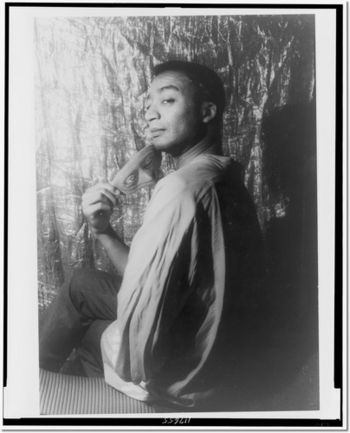Henry Van Dyke: October 3, 1928 - December 22, 2011
Photo: Henry Van Dyke by Carl Van Vechten, November 13, 1962.
Henry Van Dyke (born Henry L. Van Dyke, Jr.) novelist, editor, teacher, musician and bon vivant, died on December 22, 2011 of heart failure at the nursing home into which he had recently moved.
Michael Henry Adams, an historian with an eye to the future and a will to save, savor and share the glory of the past and the best of today, writes of Van Dyke:
- As a black, gay writer, my casual friend Henry Van Dyke was arch and promising enough to be photographed by Van Vechten. He was charming, if he wished to be, and good looking enough to be befriended by Bobby Short, with whom he had an unsatisfying dalliance. Writing, he mostly skirted sexuality.... He won a couple prizes, and his short story, "The Red Shoes", which spoofs uptight, even though dying, Bobby Short, shown 'relaxing' at his villa in the South of France, disparaging militantly open, more outre gays, is wickedly, laugh-out-loud funny.
Adams adds about Van Dyke: "He sounded sincere saying how he adored my pea soup with peppermint and chicken stock."[1]
In his lifetime Van Dyke experienced both the Jim Crow South and the less rigidly segregated North, but quickly moved into high cultural circles that rejected the color bar. Born in Allegan, Michigan, to an academic family, he spent his childhood in Montgomery, Alabama, where his father taught at Alabama State Teachers College.
Back in Michigan for high school, his first ambition was to become a concert pianist, but the near impossibility of that for a person of color at the time led him to major in journalism at the University of Michigan. He never abandoned the piano, however, and practiced for the rest of his life. After graduating with an MA in 1955 he worked as a journalist for a time.
While at Michigan he won an Avery Hopwood Award for Fiction, which encouraged him to pursue creative writing. During a stint on the editorial staff of Basic Books in New York, his first novel, Ladies of the Rachmaninoff Eyes was published in 1965 by the prestigious publisher, Farrar, Straus, and Giroux, followed by three more novels over the years. His shorter pieces have appeared in Transatlantic Review, Generation, Antioch Review, and The O. Henry Prize Stories, 1979.
He taught at Kent State University for many years, shuttling between New York City and Kent, Ohio. After retiring, he concentrated on writing his memoirs for posthumous publication, with anecdotes about Carl Van Vechten, Bobby Short, Patricia Neal, Gore Vidal, Lord Edward Montagu, and others among his wide circle of celebrity friends, both white and black.
Unfortunately for Van Dyke’s reputation, another Henry Van Dyke (1852-1933), a prolific author of Christian spiritual books, hogs the Wikipedia, Google and Amazon listings, demanding diligence to salvage this modern African American author.
Bibliography
Adams, Michael Henry. "Who Was Henry Van Dyke?" Accessed January 13, 2012.
Andrews, William L., Frances Smith Foster, Trudier Harris, eds. The Concise Oxford Companion to African American Literature. Oxford University Press, 2001.
Fleming, Robert. The African American Writer's Handbook: How to Get in Print and Stay in Print. Van Dyke author profiles, p. 242-243.
Hicks, Granville. “Literary Horizons,” Saturday Review, January 4, 1969, p. 93.
McGhee, Edward G. “Henry Van Dyke,” in Dictionary of Literary Biography, vol. 33, Afro-American Fiction Writers after 1955, eds. Thadious M. Davis and Trudier Harris, 1984, pp. 250–255
Fiction by Van Dyke
Blood of Strawberries (Farrar, Straus and Giroux, 1969)
The Dead Piano (1971, reprinted by W. W. Norton 1997)
Ladies of the Rachmaninoff Eyes (Farrar, Straus and Giroux, 1965)
Lunacy and Caprice (W.W. Norton and Company l987, Ballantine Books,1987)
- ↑ "Who Was Henry Van Dyke?" Accessed January 13, 2012.
